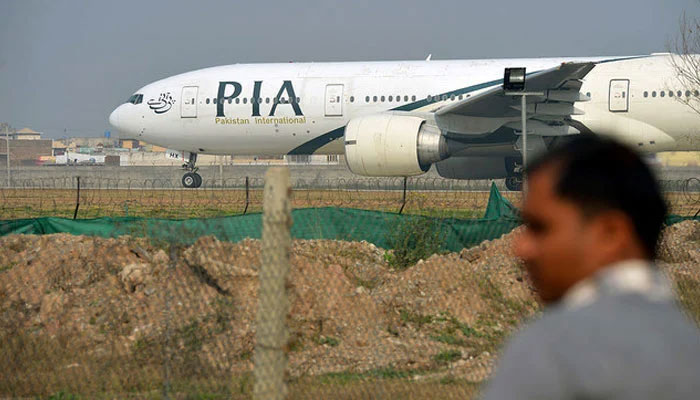Privatisation or punchline?
Since June, the government had pre-qualified six groups to participate in the bidding
The recent bidding process for the privatisation of Pakistan International Airlines (PIA) has unfolded like a tragicomedy, revealing the federal government’s staggering mismanagement and a serious lack of professionalism. With only one bidder offering a meagre Rs10 billion against the Cabinet Committee on Privatisation’s minimum sale price of Rs85 billion, the whole affair has raised alarming questions about the government’s ability to execute such a crucial economic initiative. The situation is exacerbated by reports that the lone bidder – a real-estate development company – wanted to adjust payment against plots, further illustrating how this whole exercise has been more of a mockery than anything else. The PIA privatisation saga has not emerged out of nowhere. Since June, the government had pre-qualified six groups to participate in the bidding. Yet, only one group – significantly a real-estate firm – submitted final documents before the extended deadline. What went wrong? After the International Monetary Fund (IMF) underscored the urgency of privatising state-owned enterprises as part of its new loan programme, it became clear that the government needed to demonstrate not only commitment but also competence in the process. Unfortunately, with five of the six pre-qualified groups withdrawing due to concerns over PIA’s financial burdens, aged fleet, and operational challenges, the government’s efforts seem ill-conceived and poorly executed.
The crux of the problem lies not just in the failed privatisation but also in the mismanagement that has plagued PIA for years. Aviation experts point to previous blunders, such as former PTI Aviation Minister Ghulam Sarwar Khan’s erroneous claim about ‘fake licences’ among PIA pilots, which not only tarnished the airline’s reputation but also hurt the prospects of Pakistani pilots globally. The current privatisation fiasco merely adds fuel to the fire, leading to further scrutiny of PIA’s viability as a state asset. As we look back on PIA’s once-glorious past under the leadership of Air Marshal Nur Khan – who transformed it into a profitable enterprise, with luxurious services and international acclaim – we are left wondering how it has descended into a burden on national resources. Once a symbol of pride, PIA is now emblematic of mismanagement and failure. The government’s approach to this privatisation debacle signals a broader issue; if it cannot effectively manage the sale of a major state asset, what confidence can we have in its ability to handle other privatisation initiatives that lie ahead?
Moreover, the optics of this entire situation cannot be overlooked. The headlines that splashed across newspapers and the discussions that dominated talk shows revealed a non-serious attitude towards what should be a high-stakes process. As we tentatively tread towards economic recovery, the PIA privatisation failure and also some unmet tax targets do not inspire confidence. Those responsible for this debacle need to be held accountable, and the government must adopt a more serious, strategic approach in its dealings with state assets. As Pakistan moves forward with privatisation, it must ensure that its processes are transparent, professional, and conducive to attracting serious investment. Only then can we hope to restore confidence in the governance of our national resources.
-
 Record Set Straight On King Charles’ Reason For Financially Supporting Andrew And Not Harry
Record Set Straight On King Charles’ Reason For Financially Supporting Andrew And Not Harry -
 Michael Douglas Breaks Silence On Jack Nicholson's Constant Teasing
Michael Douglas Breaks Silence On Jack Nicholson's Constant Teasing -
 How Prince Edward Was ‘bullied’ By Brother Andrew Mountbatten Windsor
How Prince Edward Was ‘bullied’ By Brother Andrew Mountbatten Windsor -
 'Kryptonite' Singer Brad Arnold Loses Battle With Cancer
'Kryptonite' Singer Brad Arnold Loses Battle With Cancer -
 Gabourey Sidibe Gets Candid About Balancing Motherhood And Career
Gabourey Sidibe Gets Candid About Balancing Motherhood And Career -
 Katherine Schwarzenegger Shares Sweet Detail From Early Romance Days With Chris Pratt
Katherine Schwarzenegger Shares Sweet Detail From Early Romance Days With Chris Pratt -
 Jennifer Hudson Gets Candid About Kelly Clarkson Calling It Day From Her Show
Jennifer Hudson Gets Candid About Kelly Clarkson Calling It Day From Her Show -
 Princess Diana, Sarah Ferguson Intense Rivalry Laid Bare
Princess Diana, Sarah Ferguson Intense Rivalry Laid Bare -
 Shamed Andrew Was With Jeffrey Epstein Night Of Virginia Giuffre Assault
Shamed Andrew Was With Jeffrey Epstein Night Of Virginia Giuffre Assault -
 Shamed Andrew’s Finances Predicted As King ‘will Not Leave Him Alone’
Shamed Andrew’s Finances Predicted As King ‘will Not Leave Him Alone’ -
 Expert Reveals Sarah Ferguson’s Tendencies After Reckless Behavior Over Eugenie ‘comes Home To Roost’
Expert Reveals Sarah Ferguson’s Tendencies After Reckless Behavior Over Eugenie ‘comes Home To Roost’ -
 Bad Bunny Faces Major Rumour About Personal Life Ahead Of Super Bowl Performance
Bad Bunny Faces Major Rumour About Personal Life Ahead Of Super Bowl Performance -
 Sarah Ferguson’s Links To Jeffrey Epstein Get More Entangled As Expert Talks Of A Testimony Call
Sarah Ferguson’s Links To Jeffrey Epstein Get More Entangled As Expert Talks Of A Testimony Call -
 France Opens Probe Against Former Minister Lang After Epstein File Dump
France Opens Probe Against Former Minister Lang After Epstein File Dump -
 Last Part Of Lil Jon Statement On Son's Death Melts Hearts, Police Suggest Mental Health Issues
Last Part Of Lil Jon Statement On Son's Death Melts Hearts, Police Suggest Mental Health Issues -
 Leonardo DiCaprio's Girlfriend Vittoria Ceretti Given 'greatest Honor Of Her Life'
Leonardo DiCaprio's Girlfriend Vittoria Ceretti Given 'greatest Honor Of Her Life'




